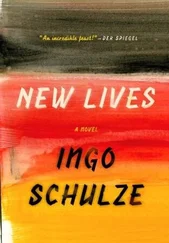“Dalmatia,” Pavel said. “An utter horror. You tell it better.”
“There’s not much to tell. That’s the thing — you can’t get at it.” Ines stared straight ahead.
Elvira bent forward, trying to get a look at Ines at the far end of the four-seater.
“Well, give it a go,” Susanne said.
“The Kornati Islands,” Ines said, shaking her head. “We had heard about them in Zagreb. When we said we wanted to drive to Zadar, the first thing you heard was the Kornati Islands, from all sides, the Kornatis. And Roman, who booked our stay for us, even talked about how Oscar Wilde called the Kornati Islands a paradise. From our balcony we could see the sea, and to the left, a little hidden by trees and a sliver of land, you could sort of make out Zadar, two-thousand-year-old Zadar. We had read in our travel guide that Hitchcock had seen the most beautiful sunrise of his life in Zadar, or something like that, at any rate Hitchcock had been there, and after ’45, once the rubble had been cleared away — the Allies had bombarded, because of the Germans or the Italians — they discovered a Roman forum under all the debris. Zadar isn’t as spectacular as Split, no Palace of Diocletian, but the churches are lovelier, and on Saturdays there are several weddings in each of them, with musicians standing out in front and men swinging Croatian flags. I liked Zadar right off, if only because of Anja, our landlady. She had waited two hours for us in the supermarket parking lot. Anja rode ahead on her red Vespa, her white helmet leading the way. Pavel fell in love with her on the spot, with her big breasts and long black hair.”
“She was incredibly likable,” Pavel said.
“She must have had her three sons while she was still very young, the oldest is fourteen. I could tell right off that Anja had kids. She just radiates something.”
“She spoke German, really first-rate German.”
“She kept asking Pavel whether that’s how you put it — even though they understood each other anyway, Polish and Croatian are practically the same thing—”
“She said her husband could take us out to the Kornati Islands. And we thought, Why not? From the shore the islands look like a chain of mountains, a marvelous view.”
“The first thing you asked was whether she was coming along—”
“I did not,” Pavel said.
“But Anja didn’t want to come along. Whenever we met she would start in about the Kornati Islands, how her husband could take us out in his own boat. All her guests made the trip — and that put me off right away, I didn’t like the sound of it. And then here it came: Three hundred euros, that was the price for friends. Pavel immediately agreed. Three hundred! I said no. No is always my job. But that was including food and drink, and whatever else we might want. Besides which we’d be starting from here, practically at our front door, and we could pick the time. Then she described the steamers we’d otherwise have to take to the Kornatis, as if it was our duty to visit these stupid islands. I said no, half that, a hundred fifty, one hundred fifty was tops, that was all that was in our travel budget. Okay, Anja said, one hundred fifty euros. Haggling is so ugly.”
“But the apartment didn’t cost us a thing,” Pavel said. “We had it for ten days for free, all paid for by Roman’s outfit in Zagreb.”
“It costs thirty-five euros a head on a tourist steamer,” Ines said.
“Must be a living hell, though, we’d had a look at one. But as for her husband, and that’s the point, we’d never seen him, although he lived in the house next door. Anja came every day on her Vespa and cooked for us, and then took off again, never stayed on, never spent the night.”
“And how do you know that?” Ines laughed.
“Because her scooter was never there, she wouldn’t arrive till around eleven on her scooter—”
“Always at eleven? I never noticed it was always at eleven, but it doesn’t matter. At any rate we didn’t see Peter until we got to the dock. He stood there like a mast on his cutter, at least six foot eight, with rimless sunglasses, wraparounds …,” Ines brushed both temples. “A guy with a deadpan face, frozen like a reptile’s. You never knew if he was even looking at you. Plus his weird English.”
“‘Guuuhd morrnink,’” went Pavel. “‘Uoun hanntert feeffti, uoun hanntert feeffti yuurro, guuuhd morrnink, madd damm.’”
“I thought how even a hundred fifty was too much for this guy. But we were seated comfortably and were alone, and when he asked if we wanted music and we said no, that was fine too. The racket from his Kalypso —that was the boat’s name, Kalypso III —was pretty loud as it was. There was something mythical about it, chug-chugging along among islands with a man tall as a tree and silent as a grave. It always startled us when Peter would turn around to bellow his bits of tour-guide wisdom. We passed a church where there’s a pilgrimage every August, because it was supposed to have snowed there one August — that’s the only thing that registered. I envied people on these islands, spectacular homes, all with a view of the water, and I envied people in their sailboats, and even those on the excursion steamers. But the farther out we got the less there was to see, the islands got bleaker and bleaker, bleached crags, uninhabited rocks, with just property lines visible, separating somebody’s lot from somebody else’s, and here and there a kind of pattern, as if someone had passed over it with a trowel in a semicircle, a petrified arch, except you can’t see what’s below the opening. So we chugged along, farther and farther, and I asked — had to shout, of course — when we would finally get to the Kornati Islands, because to our right and left now was open sea, not a single island. I’d pictured the islands as a kind of jungle, Anja had talked about rare animals. ‘This is Kornati, all this are Kornati Islands!’ he yelled, and shook his head. He was laughing at us, making fun of us. A hundred fifty euros for that! We then entered a bay and tied up at dock with other boats like ours and a few steamers. We were supposed to visit a salt lake. Then we’d have lunch. Everybody was romping around at the salt lake — what a horror. The lake gets water only from rain or if storms flood it with high surf, though it’s a riddle to me how that could happen. We sat around with nothing to do, saw schoolgirls do their changing-into-swimsuits ritual, taking their time until all the boys were gawking at them, and watched tiny crabs and mussels with long spiral shells like baroque wigs. My good mood slowly returned — I knew we’d be heading back, that the worst was over. And the meal that Peter served up was really good, huge steaks, salad, bread, then fish he claimed had just been caught. To prove it he threw bread in the water — and just like that, a huge school of fish. Peter pointed to a net, as if all he had to do was scoop them up. It was really first-class, with linen napkins, starched and ironed linen napkins, and white wine, a whole canister. They were eating on the excursion steamers, too. The smell of fried fish drifted clear over to us. We watched the day-trippers hold the fish heads with backbones attached over the railing. Gulls dived in and ripped them right from their hands, people were screeching and gulls were screeching. What a madhouse! We were glad now we hadn’t ended up on one of those steamers. I asked Peter what he did professionally. ‘Scientist,’ he replied. ‘But not here, not here.’ He pointed off in some direction—”
“‘Far away,’ Peter said, ‘far away in the past,’” Pavel added.
“I didn’t want to risk asking any details, you never know what can of worms you’re opening up. But that one question alone was too much, or maybe it was the madness with the gulls or simply the alcohol. He’d been hitting the white wine hard. And grappa, there was also home-brewed grappa. Then suddenly we took off, a sharp turn around the bow of the steamer, gulls scattering every which way. Peter was now driving a lot faster than before, and not back home but toward the south. At first it was actually fun racing through the water and being tossed around by the waves. We pulled on our jackets and held on tight. The sinful part was how close he shot by past other boats. All we saw were shocked faces, and in the next moment enraged faces. He sped right for other boats like a kamikaze pilot, and only turned away at the last second—”
Читать дальше












